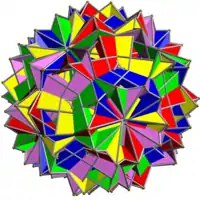Compound of five great rhombihexahedra
This uniform polyhedron compound is a composition of 5 great rhombihexahedra, in the same vertex arrangement as the compound of 5 truncated cubes.
| Compound of five great rhombihexahedra | |
|---|---|
 | |
| Type | Uniform compound |
| Index | UC66 |
| Polyhedra | 5 great rhombihexahedra |
| Faces | 60 squares, 30 octagrams |
| Edges | 240 |
| Vertices | 120 |
| Symmetry group | icosahedral (Ih) |
| Subgroup restricting to one constituent | pyritohedral (Th) |
Filling
There is some controversy on how to colour the faces of this polyhedron compound. Although the common way to fill in a polygon is to just colour its whole interior, this can result in some filled regions hanging as membranes over empty space. Hence, the "neo filling" is sometimes used instead as a more accurate filling. In the neo filling, orientable polyhedra are filled traditionally, but non-orientable polyhedra have their faces filled with the modulo-2 method (only odd-density regions are filled in). In addition, overlapping regions of coplanar faces can cancel each other out.[1]
 Traditional filling |
 "Neo filling" |
References
- Skilling, John (1976), "Uniform Compounds of Uniform Polyhedra", Mathematical Proceedings of the Cambridge Philosophical Society, 79 (3): 447–457, doi:10.1017/S0305004100052440, MR 0397554.
This article is issued from Wikipedia. The text is licensed under Creative Commons - Attribution - Sharealike. Additional terms may apply for the media files.